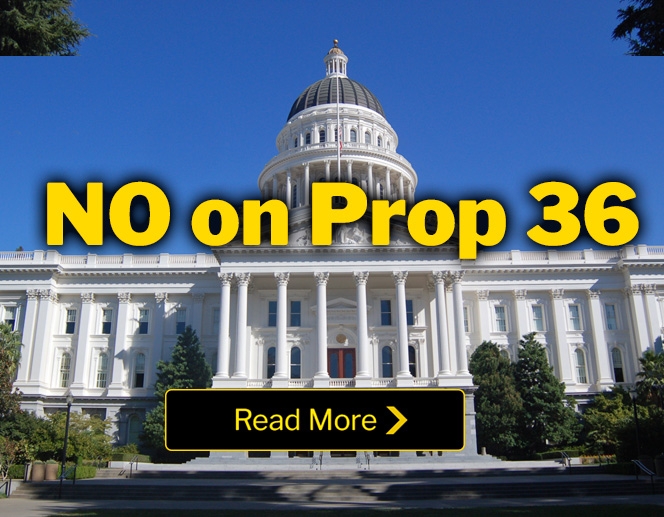Disability Rights California Opposes Proposition 36 and Any Legislation that Harms California’s Most Vulnerable Residents

Disability Rights California Opposes Proposition 36 and Any Legislation that Harms California’s Most Vulnerable Residents
The retail lobby and law enforcement have joined to introduce “The Homelessness, Drug Addiction, and Theft Reduction Act”, Proposition 36, for the November ballot. Prop 36 creates longer sentences and greater punishment for minor theft and drug related offenses while diminishing vital funding for mental health care, housing, and other community-based services.
Table of Contents

Background Information
No on Prop 36 - A Ballot Measure that Harms the Disability Community
The retail lobby and law enforcement have joined to introduce “The Homelessness, Drug Addiction, and Theft Reduction Act”, Proposition 36, for the November ballot. Prop 36 creates longer sentences and greater punishment for minor theft and drug related offenses while diminishing vital funding for mental health care, housing, and other community-based services.
Prop 36 Rolls Back Progress
In 2014, Californians passed Proposition 47, which greatly reduced the state prison population by reclassifying certain drug possession and low-level theft crimes from felonies to misdemeanors and using the savings to fund community-based programs—including funding for behavioral health care and housing.
Despite the success of Prop 47, the corporate retail lobby has joined with law enforcement to roll back Prop 47’s reforms with a series of proposed measures, none of which are evidence-based:
- Increase penalties for drug use by elevating simple possession cases to felonies;
- Mandates treatment for individuals convicted of a drug related offense, even though these treatment options do not exist;
- Increase penalties for theft offenses by elevating them to felonies; and
- Increase the use of mandatory sentencing enhancements, which removes discretion from judges and adds additional years of incarceration.
Why Defeating Prop 36 Is a Disability Priority
Prop 36 will have devastating consequences to disabled communities. People with disabilities are overrepresented at all stages of the criminal legal system—from arrest, prosecution, and incarceration. Prop 36’s regressive return to a reliance on the criminal legal system will lead to greater incarceration, forced drug treatment, and will reduce funding for community-based programs that keep our communities healthy and safe.
People with disabilities are disproportionately represented in our prison system at staggering rates, with over 40% of people in state prisons having a disability, compared to only 15% of people in the general population. In California, 1 in 3 people in prison have a diagnosed mental illness. This overrepresentation reflects decades of policies that prioritize incarceration over housing affordability and community-based alternatives that especially impact Black and brown communities, and people experiencing homelessness.
Prop 36 will expand the number of Californians with disabilities in our prison system, while also disabling people who enter the system. People with disabilities experience inhumane treatment in prison and jail where they are often denied proper accommodations, medical care, and services. Further, prison and jail conditions often exacerbate people’s existing conditions, meaning people are at risk for leaving incarceration with disabilities they did not have when they entered the system.

Press Releases & Statements
- Opinion: Why Californians Must Reject Proposition 36 This November
- Disability Rights California and Community Advocates for Just and Moral Governance Urge San Diego Board of Supervisors to Oppose Prop 36 and Protect San Diegans
- Disability Rights California Oppose Proposition 36 and Any Legislation that Harms California’s Most Vulnerable Residents

Debunking the Myths about Proposition 36
Proposition 36 is an effort to rollback successful reforms approved by Californians a decade ago through Proposition 47. It is often blamed for the perceived increase in crime. This factsheet addresses common myths surrounding Proposition 47 and seeks to clarify misconceptions about its impact on public safety.
Myth 1:
Retail theft is increasing.
Fact:
The corporate retail lobby is exaggerating claims about retail theft. In December 2023, the National Retail Federation (NRF), the main lobbying group for U.S. retailers, falsely claimed that organized retail crime, which involves theft for resale rather than personal use, accounted for nearly half of all inventory losses in 2021. They later retracted this claim.
What is true, however, is that the rise of surveillance technology, cell phone cameras, and the rapid spread of footage across the internet—amplified by social media echo chambers like Nextdoor—has heightened the perception that crime is rampant. But this perception does not align with reality.
The reality is that property crimes, including shoplifting, are at a near record low. A recent report by the Center on Juvenile and Criminal Justice, using data from the California Department of Justice, indicates that property crime rates—including shoplifting—confirms this downward trend is continuing into 2024, with nearly every crime category showing declines. Specifically, data from 48 California cities reveal widespread reductions, with theft decreasing by 11% and burglary by 17% in the first three months of 2024 compared to the same period in 2023.
Myth 2:
Proposition 47 has led to a significant increase in violent crime.
Fact:
Evidence indicates that Prop 47 did not cause a rise in violent crime. A 2018 study by the Public Policy Institute of California found, in fact, no increase in violent crime attributable to Prop 47 and only a slight increase in property crime, mainly driven by thefts from cars.
Myth 3:
Prop 47 legalized theft under $950.
Fact:
Prop 47 reclassified certain non-violent property and drug crimes from felonies to misdemeanors, but it did not legalize theft under $950. Misdemeanors can still lead to jail time. California’s system still emphasizes punishment.
Myth 4:
Prop 47 has not benefited public safety.
Fact:
Proposition 47 has had lasting effects for public safety and family togetherness. It was a grassroots reform driven by California communities to correct some of the excesses of the worst era of mass incarceration. Passed by a nearly 60 to 40 percent margin in 2014, it reclassified non-violent drug possession and low-level theft crimes from felonies to misdemeanors, while directing money saved from these reductions to help people leaving prison to re-enter their communities. This community-led initiative significantly improved the lives of thousands by removing or avoiding felony convictions, fostering great stability and safety for families and communities.
Myth 5:
Prop 36 increases funding for substance use treatment.
Fact:
Proposition 36 does not provide any new funding for substance use treatment - absolutely none. Instead, it would undo the progress from Proposition 47 and funnel money for services back into the prison system. Between 2016 and 2023, Proposition 47, which Proposition 36 seeks to revert, saved nearly $600 million in prison costs, while providing services to an estimated 40,000 people, including housing support and behavioral health care that help prevent houselessness. Studies indicate that program participation reduced recidivism racial disparities in California prisons. On the other hand, Proposition 36 offers no new solutions or funding for substance use treatment.
Myth 6:
Proposition 36 will address houselessness.
Fact:
Proposition 36 provides no new money for housing. It could actually push more Californians into homelessness. According to a recent article by CalMatters, proponents of Proposition 36 argue the measure would slash the homeless population by pushing those struggling with drug addiction into treatment. However, all evidence proves the contrary: The number one reason Californians end up homeless is a loss of income — not drug use, according to a UC San Francisco study. A recent statewide homelessness study found that nearly 1 in 5 unhoused Californians (19%) entered homelessness directly from an institutional setting, primarily a jail or prison. Additionally, fewer than 20% of people leaving jail or prison had support finding housing upon their release, stated by California Budget and Policy Center.

How Various Retail Theft Bills Align with Proposition 36 Provisions
Easier punishment for low level offenses.
- Proposition 36: make it easier to punish people convicted of low-level theft offenses with felony charges. A person with two or more petty thefts on their record can be sent to prison regardless of the amount taken; the amounts of two or more separate thefts can be combined to surpass the $950 charging threshold.
- AB 2943 (Zbur): This bill similarly makes it easier to punish people for low level theft offenses by allowing police to make warrantless arrests for shoplifting (meaning the officer can do so as long as they have “probable cause” the person has committed shoplifting even if they are not present).
- SB 905 (Weiner): SB 905 introduces harsher penalties for property stolen from cars, saying if the person steals property from the car that has at least $950 they can be charged with a misdemeanor or felony.
- AB 3209 (Berman): expands use of restraining orders in instances of theft, vandalism or battery involving a retail establishment; persons would be barred from that location or related locations, including parking lots.
- AB 1972 (Alanis): This bill expands the scope of the property crimes task force to include cargo theft as a property crime moving forward.
Coerces people into treatment where it may not be needed or helpful.
- Proposition 36 reverts punishment for drug possession to the felony level for a third offense. It allows a judge to require a person to participate in a drug treatment or mental health program, under threat of a prison sentence. Failure to satisfactorily complete these programs will result in a person going to prison.
- AB 2943 (Zbur): Allows courts to extend probation periods beyond one year if the individual is referred to a collaborative court or rehabilitation program “addressing the underlying factors of their offense”; similar to prop 36’s provision that requires a person to participate in drug treatment in instances where it may not be needed and as a condition of a person’s freedom.
Adds sentences enhancements in relatively rare instances of organized retail theft.
- Proposition 36: adds a sentencing enhancement if two or more people take or damage property while committing a felony.
- AB 1802: This bill makes organized retail theft a permanent crime in California, similar to how Prop 36 introduces harsher penalties for theft involving two or more people.
- SB 982: Eliminating the end date for prosecuting organized retail theft, which aligns with Prop 36’s approach toward imposing longer sentences for what they defined as coordinated theft activities.
- SB 1242: enhances penalties for arson related to organized retail theft, meaning longer sentences.
- SB 1416: creates a sentencing enhancement for selling, exchanging or returning for value an item acquired through shoplifting, burglary or theft starting at 50,000 and up to and beyond 3 million dollars. If they act in concert with another person, the higher the sentence.
Adds sentences enhancements for drug related crimes
- Proposition 36: adds a variety of sentencing enhancements for drug related crimes, including facilitating charging a person with murder if they give or sell another person fentanyl and that person dies as a result of using it.
- Retail theft legislation does not add enhancements for drug related crimes, though it does add enhancements for retail theft related crimes.
Other
- SB 1144 (Skinner): The regulation of online marketplaces and enforcement against high-volume sellers of stolen goods aligns with Prop 36’s intent to crack down on the sale of stolen property.

Other Reference Materials
- Understanding Proposition 36 California Budget & Policy Center
- A vote for Prop. 36 is a vote for mass incarceration of people with disabilities The Orange County Register
- Opinions about California’s ballot propositions for the Nov. 5, 2024 election The Orange County Register








